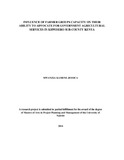| dc.description.abstract | Farmer groups have been in existence since 1920's. They have been used as a strategy to address many development issues in different societies. In Kenya, the concept of farmer groups (FGs) has been employed in delivery of agricultural services. Today the agricultural extension services are demand driven hence it is important to investigate whether the FGs have the capacity to engage the government in provision of such services. This study sought to: determine the level at which size and status of farmer groups influence their ability to advocate for government agricultural services; examine the extent to which farmer group management influence their ability to advocate for government agricultural services; Investigate whether the financial status of farmer groups influence their ability to advocate for government agricultural services and establish the extent at which farmer groups empowerment influence their ability to advocate for government agricultural services in Khwisero Sub County. This study adopted a descriptive design. The target population was 3630 farmers belonging to 242 farmer groups in the study area. A sample of 351 farmers was drawn from the target population using sampling table by Krejcie & Morgan (1970).This study adopted multi stage cluster sampling technique. The first stage employed area sampling in which the study area was divided into seven location or strata namely: Kisa South, Mulwanda, Kisa West, Kisa North, Eshirombe, Kisa East and Kisa Central. Proportionate stratified simple random sampling technique was used to determine the number of groups to be sampled in each selected stratum. Sample groups from each stratum were chosen randomly including the individual farmers to be interview. Key informants and FGs for Focused group discussion were purposively selected from the four sampled strata. Primary data was collected by the aid of questionnaires. Validity of the questionnaire was attained by carrying out a pilot test and reliability through test re- test and half split reliability. Both qualitative and quantitative data collected was scored, edited, coded and analyzed using computer software known as Statistical Package for Social Sciences (SPSS) version 22 to compute descriptive statistics (frequencies, means, percentages and standard deviations).
Content analysis was also employed on data collected using open ended questions through interviews and FGDs. The analyzed data was presented using tables. This study found out that the size and status of farmer group and levels of FGs financial status account for 18.5% and 26.6% of all the variation in advocated government agricultural services respectively. Group management accounts for 15.4% of all variation in advocated agricultural services. This means that there must be other factors that influence FGs ability to advocate for agricultural services. There was no statistical evidence to show that farmer empowerment had influence on dependent variable. Only 66 (20.1%) of the respondents had sought agricultural services. However most of the farmers who had sought the services had received agricultural training. The study recommends that the government should consider reviewing its extension policy that requires the farmers to seek for agricultural services from the government officers at a pay. The FGs should be trained on financial mobilization especially proposal writing to enable them seek external funding from donors and government institutions. The researcher recommended this study to be replicated in other areas of the country to generate evidence for farmers to engage the government in policy reforms. Further studies are needed to investigate whether the county governments have the capacity to provide agricultural services to farmers. | en_US |

